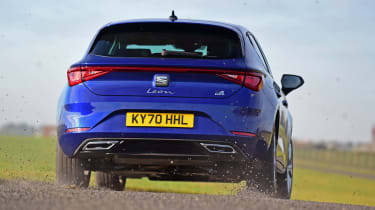SEAT Leon e-Hybrid review
With a strong pure-electric range, stylish looks and family-friendly practicality, the SEAT Leon e-Hybrid is one of our favourite plug-in hatchbacks
Pros
- Pleasingly fast
- BiK as low as 7%
- Stylish and practical
Cons
- 11% BiK for some versions
- Golf GTE has greater badge appeal
- Drivetrain not as smooth as Mercedes'
| Car type | Electric range | Fuel economy | CO2 emissions |
|---|---|---|---|
| Plug-in hybrid | 36-40 miles | 217-235mpg | 27-28g/km |
After a slow start, plug-in hybrid technology is now appearing in nearly all areas of the car market – including the important family-hatchback category. The Mercedes A 250 e was first out of the blocks in 2019, but now the VW Group is getting in on the action, launching all-new versions of the Volkswagen Golf and Audi A3 plug-in hybrids, as well as bringing the technology to the Skoda Octavia and SEAT Leon for the first time.
They all use the same basic hardware, and in the case of the Leon e-Hybrid we're reviewing here, the 1.4-litre TSI petrol engine and electric-motor combination makes 201bhp. The 13.1kWh battery holds enough electricity when fully charged to take the car for up to 40 miles in zero-emissions mode.
The days of plug-in hybrids being expensive standalone models are largely gone now; this powertrain is available across nearly the entire Leon range, with the exception of the entry-level SE and SE Dynamic trim levels. That means list prices start at just below £31,000, but as always with plug-in hybrids, the number that really matters is the Benefit-in-Kind (BiK) rate, which determines how much company-car tax the car attracts.
In the Leon's case, its 27-28g/km CO2 emissions and electric range of up to 40 miles put it in the 7% band. Note, though, that the range-topping FR Sport and Xcellence Lux versions with larger wheels (as well as the ST estate in any spec) can't quite hit the 40-mile mark and are thus in the 11% band. Either way, you're looking at a huge reduction on the company-car tax bill for a purely petrol or diesel-engined alternative.
Seen from the outside, there are very few visual clues to those technical and financial points of difference between the hybrid and non-hybrid Leons. The plug-in has a large flap on the front wing covering its charging port and a small 'e-Hybrid' bootlid badge, but otherwise looks pretty much the same as any other Leon.
With even the cheapest hybrid Leon – the FR – coming with a truckload of kit, and the car being impressive overall regardless of what power source is under the bonnet, it's not a surprise to find that the Leon e-Hybrid is one of our favourite plug-in models on sale right now. The 6% BiK rating for some models, along with the availability of a practical estate, some great in-car technology and a satisfying driving experience all combine to make the Leon a real company-car star – and worthy of consideration by low-mileage private buyers, too. For a more detailed look at the SEAT Leon e-Hybrid hatchback, read on for our full in-depth review...
